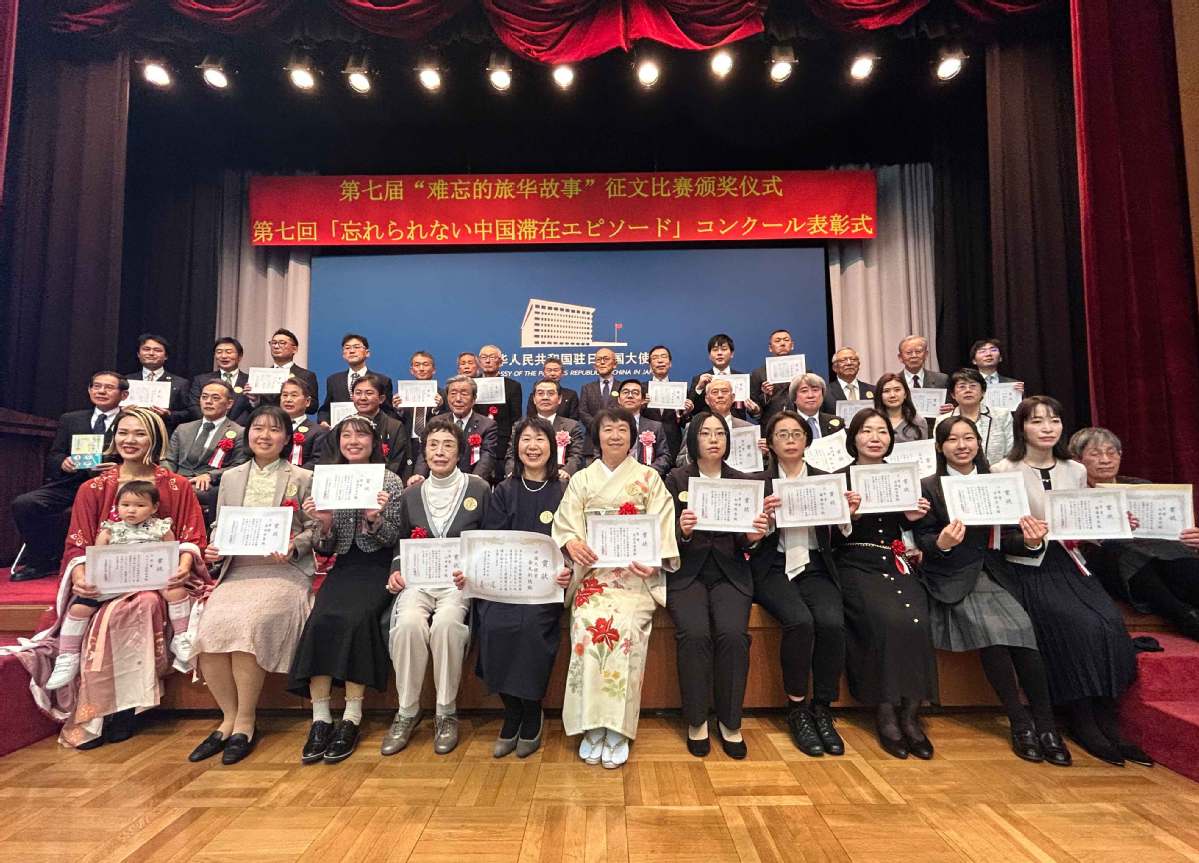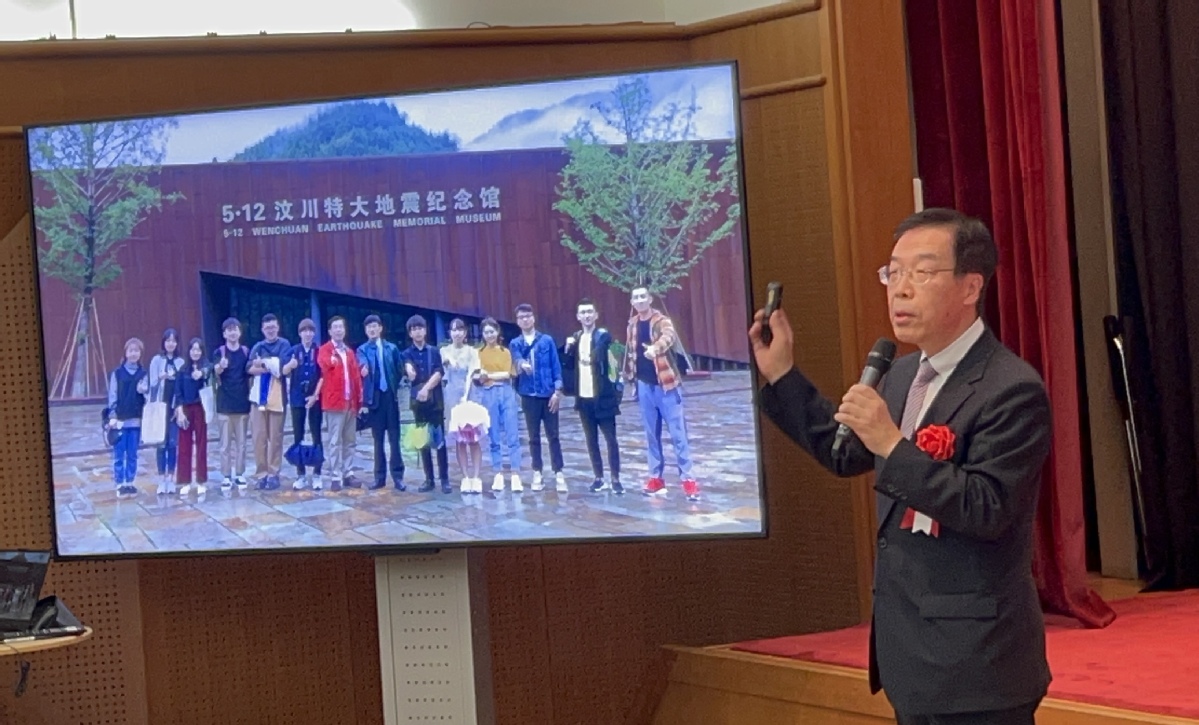In an effort to foster cultural exchange, interpersonal interaction and mutual understanding between China and Japan, about 200 people convened at the Chinese embassy in Tokyo on Friday for an award ceremony honoring winners of an annual essay contest showcasing unforgettable experiences in China.
The event highlighted the impactful role of personal narratives in bridging cultural divides and strengthening ties between the two nations.
The contest, initiated in 2017 by The Duan Press, a Tokyo-based publishing company, originally focused on stories from Japanese students studying in China. In 2018, its scope broadened to include expatriates, travelers and any Japanese individual with firsthand experience of life in China. Renamed "Unforgettable Experiences in China", the contest has been held annually ever since.
Over the past seven years, more than 2,000 participants have shared narratives that include memorable local episodes, stories of learning and inspiration, cross-border friendships, new discoveries and honest depictions of China as seen through Japanese eyes — offering unique insights into aspects of China seldom known to outsiders.

The winners of an annual essay contest highlighting unforgettable experiences in China gather for a commemorative photo alongside Japanese guests and Chinese diplomats during an award ceremony at the Chinese embassy in Tokyo on Dec 27. [Photo by Jiang Xueqing/chinadaily.com.cn]
At the award ceremony, Chinese Ambassador to Japan Wu Jianghao emphasized the importance of the initiative in fostering grassroots exchanges and mutual understanding between the two nations.
This year, over 200 individuals, ranging in age from 91 to elementary school students, participated in the contest. Winners came from a wide array of backgrounds, reflecting a diversity of connections to China, from enduring relationships to recent experiences.
"I hope that more new participants will visit China, write about their experiences, and share them widely," Wu said.
He also highlighted recent diplomatic milestones, including Japanese Foreign Minister Takeshi Iwaya's productive discussions with his Chinese counterpart in Beijing earlier this week.
Wu expressed his sincere wish for 2025 to be a year marked by significant exchange and collaboration between China and Japan.

Hiroshi Moriyama (third from left), secretary-general of Japan's ruling Liberal Democratic Party, and Chinese Ambassador to Japan Wu Jianghao (fourth from left) pose alongside the grand prize and special award winners of an essay contest showcasing unforgettable experiences in China. The award ceremony was held in Tokyo on Dec 27. [Photo by Jiang Xueqing/chinadaily.com.cn]
Hiroshi Moriyama, secretary-general of Japan's ruling Liberal Democratic Party, expressed optimism that the contest would further strengthen exchanges between the two nations.
"I sincerely hope that through various initiatives, Japan and China can deepen their friendship and continue to contribute to global economic development and peace," he said.
Reflecting on his contributions of establishing a sister city relationship between Kagoshima and Changsha, Hunan province, as well as his visits to China this year, Moriyama spoke about his experience witnessing remarkable development and innovations, such as Changsha's advanced unmanned farms.

Minoru Okada, a professor at the Faculty of International Studies at Takushoku University and a first prize winner, proposes that school field trips and youth exchange programs incorporate visits to disaster-affected areas in both Japan and China to foster understanding and remembrance. [Photo by Jiang Xueqing/chinadaily.com.cn]
Yoichi Masuzoe, former governor of Tokyo and a special award recipient, also highlighted China's technological advancements, including the latest electric vehicle models he encountered in Guangzhou, Guangdong province.
Masuzoe visited Beijing and Guangzhou this year and dispelled misconceptions about traveling to China.
"When I mention my plans to visit China, I often hear warnings like, 'You might get detained for spying.' But when I attend international conferences, I see no basis for such fears. The negative imagery is perpetuated by media and publications that profit from sensationalism. The best way to counter this is through firsthand experiences," said Masuzoe.
He emphasized that recent diplomatic developments, including the meeting between Japan's foreign minister and Chinese officials, underscore the vital role of people-to-people exchanges. He added that fostering opportunities for interaction through business, cultural events and tourism is essential for deepening mutual understanding.

Ai Fukuhara, an Olympic medalist and retired Japanese table tennis player, is honored with a special award. She expresses heartfelt gratitude for the support she has received from China. [Photo by Jiang Xueqing/chinadaily.com.cn]
Ai Fukuhara, an Olympic medalist and retired Japanese table tennis player, was honored with a special award. Reflecting on her experience of attending table tennis training camps in China, she expressed heartfelt gratitude for the support she has received from China throughout her career and in her post-retirement pursuits.
Last month, Fukuhara explored Sichuan province, where she tried skydiving and spicy hotpot for the first time.
"It was an incredible experience, filled with fun and excitement. The breathtaking scenery I saw while skydiving in Sichuan is something I will cherish for the rest of my life," she said.
Rie Kanamaru, a housewife and the grand prize winner, shared her story of adapting to life in China during her 12-year residence in Wuhan, Suzhou and Guangzhou from 2012 to October 2024.
"At first, I was apprehensive about living in China, but my desire to interact more smoothly with my neighbors, who have always treated me warmly, has enabled me to be proactive in learning the language and understanding Chinese culture," Kanamaru wrote.
Her essay focused on how participating in morning exercises with her neighbors helped her integrate into her local community. Through daily interactions and language studies, she acquired proficiency in Mandarin, passing the HSK Level 6 exam in 2019.

Moine Maeda Miki, a YouTuber and third prize winner of the essay contest, performs a traditional Chinese dance at the award ceremony in Tokyo on Dec 27. [Photo by Jiang Xueqing/chinadaily.com.cn]
Moine Maeda Miki, a 39-year-old YouTuber and third prize winner, recently returned to Japan after living in Guangzhou for about three years. Her essay recounted her experience of giving birth in China, breaking down stereotypes about the country.
"What I want to share with everyone today is something I've felt strongly during my three years in China and through my YouTube activities: many Japanese people still hold a lot of biases and misconceptions about China. That's why personal, authentic stories like the ones shared here are incredibly important. Your experiences have the power to reach others and challenge stereotypes," Moine Maeda said at the award ceremony.
"I hope that sharing my own experiences honestly and authentically will contribute, even in a small way, to fostering mutual understanding and a positive relationship between Japan and China," she added.